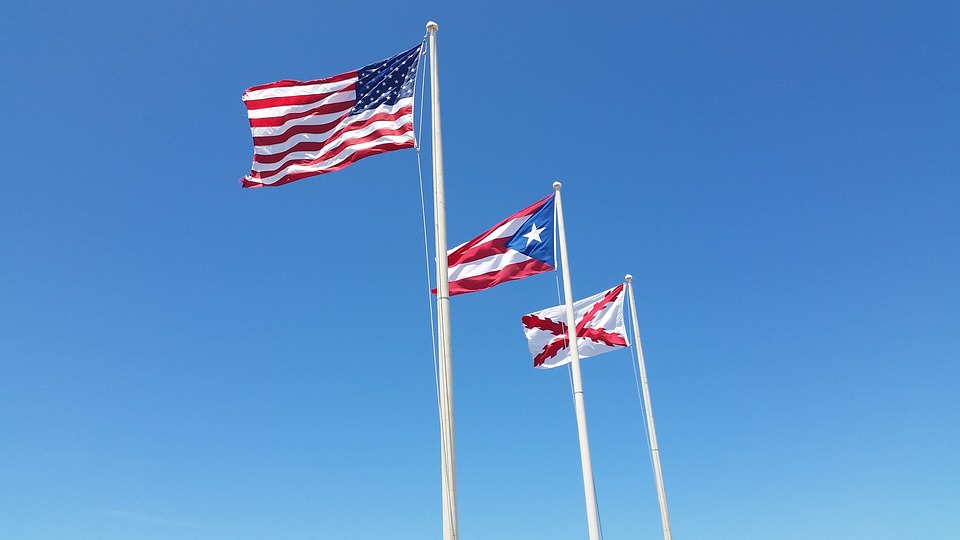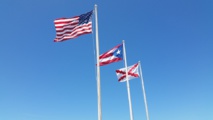In the words of economist Rudiger Dornbusch, "the crisis matures for much longer than you think, and much faster than you could imagine ... He approaches forever, and happens overnight."
So the Puerto Rican crisis is. It has been ripening for a long time, but its scale reached the Americans over the weekend, when the governor of Puerto Rico Alejandro Garcia Padilla announced that they could not repay the government debt.
On Monday, the governor of the island with a population of 3.6 million people called for negotiations with the bondholders for the restructuring of debts and deferral of payments.
Ideally, the government of the island and its bond holders would like to see them all rescued by Washington, but the Obama administration has not yet expressed a wish to fork out for it. The Republicans Congress ruling now, especially its conservative wing, are certainly not going to throw dollars to the island.
Although, the spokesman for the White House Josh Ernest is now gently saying that Congress might consider giving Puerto Rico the right to the declaration of bankruptcy, which the American states do not have, unlike the cities. Puerto Rico, which is not included in the US, but is managed by them, in this sense, is equivalent to the state.
The Congress is considering a bill to grant the right to the declaration of bankruptcy, which automatically provides protection from creditors at least a Puerto Rican state corporations - such as the one that provides the island with electricity.
Washington guardians of the island would like to see Congress giving them the opportunity to declare bankruptcy under Chapter 9 of the Tax Code of the United States. This option of bankruptcy suggests that the insolvent debtor gives to the judge a report on their holdings and financial obligations, and offers the order of debt repayment, that is to say, how much they can pay to their creditors such as bondholders, pensioners and employees.
In a typical bankruptcy, creditors have the right to put forward their plans for debt - for example, insist that the debtor sold some property or sharply reduced wages. Bankruptcy Chapter 9 of the creditor's does not gives such a right, therefore, debtors prefer it.
- We cannot allow that we were forced to choose between paying our police, our teachers, our nurses or pay debts!, - Said the Governor Padilla.
Bankruptcy Chapter 9 recently saved Detroit, which went to pot mainly because of their unbearable pension obligations to municipal employees.
Another reason is called in the case of Puerto Rico. The conservative Wall Street Journal blames the the Governor Padilla’s reluctance on dismissing civil servants, whose salaries absorb two-thirds of the budget of the island.
According to the US Census Bureau, the average income of Puerto Rican families is around 20 thousand dollars a year. Salaries of state officials exceed this amount more than twice.
Salaries of employees of the central government exceeds the salary in the private sector by more than 90%.
In Greece, over 150 thousand civil servants were laid off because of the crisis. The budget of Puerto Rico for the following fiscal year, adopted at the beginning of the week, does not contain plans of downsizing.
The report on the finances of the island, which is released on Monday by the former World Bank chief economist Anne Krueger, notes that, although in the last decade the number of students in Puerto Rican schools decreased by 40% due to the continued migration from the island to the United States, the number of teachers increased by 10% .
Hundreds of unnecessary school buildings should be closed in Puerto Rico, the report said. Kruger also notes that only 40% of the population are employed or actively seeking work, while the proportion reaches 63% on the mainland.
The rest of the Puerto Ricans either idle, or work in the informal economy.
One of the reasons for the under-employment is that state aid to the inhabitants of the island is 1,743 dollars a month, while the minimum wage - 1159 dollars. Many believe that the work in this situation is simply meaningless.
In May, the unemployment rate reached 12.4%, what is more than double the American rate.
According to the Wall Street Journal, Puerto Rico, unlike Greece, which should be accountable to the European Union, for the most part granted to itself. Dozens of its government departments and state-owned corporations year after year drove the budget to deficit, which was covered by the sale of bonds.
The latter were of great demand because they are not exempted either the federal or local taxes. Puerto Rican bonds are held by a series of giant US pension funds, so if the island is unable to pay debts, it will hit many Americans.
According to Associated Press calculations of American funds, in 1884, approximately 377 funds working with the bonds, hold Puerto Rican paper. Therefore, the state of finances of the island is far from indifferent to them and their customers.
Puerto Rico has free access to the giant US economy and - unlike Greece - for decades receives subsidies from the US. According to historians, Washington wanted a thriving island with market economies to eyesore communist Cuba.
Washington, among other things, pays its residents old-age pensions and provides standard health insurance, although the islanders do not pay federal income tax, and the local is only 4%.
For comparison: the highest federal income tax rate on the mainland reaches 39.6%. Many states have their own taxes. In California, for example, the maximum income tax rate is 13.3%.
Despite all these advantages, proportionate debt of Puerto Rico is far higher than any US state debt.
But, although it has already started to be called "the US Greece" in the press, Puerto Rican crisis for the US is much less interesting than the events in the distant Hellas.
As economist Dornbusch warned, it can change overnight.
source: bbc.com
So the Puerto Rican crisis is. It has been ripening for a long time, but its scale reached the Americans over the weekend, when the governor of Puerto Rico Alejandro Garcia Padilla announced that they could not repay the government debt.
On Monday, the governor of the island with a population of 3.6 million people called for negotiations with the bondholders for the restructuring of debts and deferral of payments.
Ideally, the government of the island and its bond holders would like to see them all rescued by Washington, but the Obama administration has not yet expressed a wish to fork out for it. The Republicans Congress ruling now, especially its conservative wing, are certainly not going to throw dollars to the island.
Although, the spokesman for the White House Josh Ernest is now gently saying that Congress might consider giving Puerto Rico the right to the declaration of bankruptcy, which the American states do not have, unlike the cities. Puerto Rico, which is not included in the US, but is managed by them, in this sense, is equivalent to the state.
The Congress is considering a bill to grant the right to the declaration of bankruptcy, which automatically provides protection from creditors at least a Puerto Rican state corporations - such as the one that provides the island with electricity.
Washington guardians of the island would like to see Congress giving them the opportunity to declare bankruptcy under Chapter 9 of the Tax Code of the United States. This option of bankruptcy suggests that the insolvent debtor gives to the judge a report on their holdings and financial obligations, and offers the order of debt repayment, that is to say, how much they can pay to their creditors such as bondholders, pensioners and employees.
In a typical bankruptcy, creditors have the right to put forward their plans for debt - for example, insist that the debtor sold some property or sharply reduced wages. Bankruptcy Chapter 9 of the creditor's does not gives such a right, therefore, debtors prefer it.
- We cannot allow that we were forced to choose between paying our police, our teachers, our nurses or pay debts!, - Said the Governor Padilla.
Bankruptcy Chapter 9 recently saved Detroit, which went to pot mainly because of their unbearable pension obligations to municipal employees.
Another reason is called in the case of Puerto Rico. The conservative Wall Street Journal blames the the Governor Padilla’s reluctance on dismissing civil servants, whose salaries absorb two-thirds of the budget of the island.
According to the US Census Bureau, the average income of Puerto Rican families is around 20 thousand dollars a year. Salaries of state officials exceed this amount more than twice.
Salaries of employees of the central government exceeds the salary in the private sector by more than 90%.
In Greece, over 150 thousand civil servants were laid off because of the crisis. The budget of Puerto Rico for the following fiscal year, adopted at the beginning of the week, does not contain plans of downsizing.
The report on the finances of the island, which is released on Monday by the former World Bank chief economist Anne Krueger, notes that, although in the last decade the number of students in Puerto Rican schools decreased by 40% due to the continued migration from the island to the United States, the number of teachers increased by 10% .
Hundreds of unnecessary school buildings should be closed in Puerto Rico, the report said. Kruger also notes that only 40% of the population are employed or actively seeking work, while the proportion reaches 63% on the mainland.
The rest of the Puerto Ricans either idle, or work in the informal economy.
One of the reasons for the under-employment is that state aid to the inhabitants of the island is 1,743 dollars a month, while the minimum wage - 1159 dollars. Many believe that the work in this situation is simply meaningless.
In May, the unemployment rate reached 12.4%, what is more than double the American rate.
According to the Wall Street Journal, Puerto Rico, unlike Greece, which should be accountable to the European Union, for the most part granted to itself. Dozens of its government departments and state-owned corporations year after year drove the budget to deficit, which was covered by the sale of bonds.
The latter were of great demand because they are not exempted either the federal or local taxes. Puerto Rican bonds are held by a series of giant US pension funds, so if the island is unable to pay debts, it will hit many Americans.
According to Associated Press calculations of American funds, in 1884, approximately 377 funds working with the bonds, hold Puerto Rican paper. Therefore, the state of finances of the island is far from indifferent to them and their customers.
Puerto Rico has free access to the giant US economy and - unlike Greece - for decades receives subsidies from the US. According to historians, Washington wanted a thriving island with market economies to eyesore communist Cuba.
Washington, among other things, pays its residents old-age pensions and provides standard health insurance, although the islanders do not pay federal income tax, and the local is only 4%.
For comparison: the highest federal income tax rate on the mainland reaches 39.6%. Many states have their own taxes. In California, for example, the maximum income tax rate is 13.3%.
Despite all these advantages, proportionate debt of Puerto Rico is far higher than any US state debt.
But, although it has already started to be called "the US Greece" in the press, Puerto Rican crisis for the US is much less interesting than the events in the distant Hellas.
As economist Dornbusch warned, it can change overnight.
source: bbc.com



















